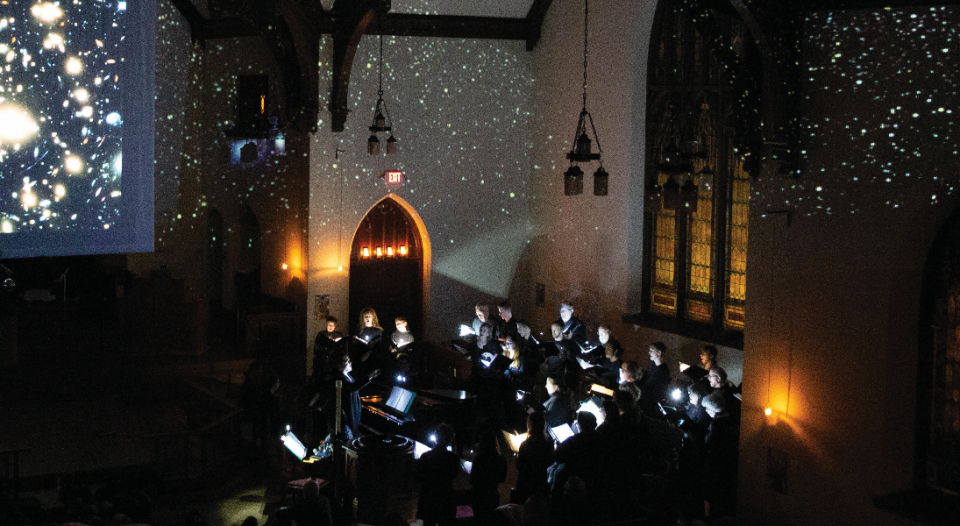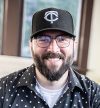Every couple of years, on a dark night in winter, the sanctuary at University Lutheran Church of Hope (ULCH) in Minneapolis is transformed into a planetarium. During the event, called Night Songs, constellations are projected across the worship space, blanketing the ceiling and giving the appearance of a night sky somewhere beyond the city lights.
Attendees—from the congregation and the area—fill the pews and lie on the sanctuary floor, some with pillows and blankets from home, taking in the beauty of the stars overhead and the nebulae, star clusters and planets projected on a massive cloth screen at the front of the sanctuary. Choirs, musicians and poets from the community, along with liturgical elements from Evangelical Lutheran Worship, provide a backdrop of word and song connected to the program’s thematic focus.
In past years, Night Songs has largely centered on images and music related to night, highlighting the beauty of the night sky and challenging the negative associations we bring to darkness. But in February 2020, Night Songs also featured images and poetry highlighting the impact of climate change on the planet and the existential threat it poses to our communities.
Night Songs began in 2011 when Scott Rohr, then worship and music director for ULCH, asked James Flaten, a choir member and the associate director of NASA’s Minnesota Space Grant Consortium, to assist him in developing a choral program that challenged negative connotations of darkness. Flaten, who teaches aerospace engineering at the University of Minnesota, Twin Cities, proposed using astronomical images to point to the deep beauty of the night sky.
“[The imagery] is what makes this unique,” Flaten said. “What makes it different, what makes people remember it, are the images.”
When Zach Busch assumed the role of minister of worship and music at ULCH, he took on the planning and coordinating of Night Songs with Flaten and thought that some additional themes could add to the power of the event.
“It occurred to me that we could—in the spirit of the way the program puts different subject matter together, like music and science—put a theme in that wasn’t [exclusively] night,” Busch said. “The first program we did was focused on social justice, and we used the language of dreams to recall that justice mindset.”
“I think taking in the arts brings you into an encounter with that sacred spiritual thing, and somewhere in there, the Holy Spirit inspires our action.”
A manifestation of the Spirit
The addition of this thematic element to the event was well-received and inspired the planning team to consider how the setting of Night Songs might provide a unique environment for engaging with other difficult topics.
“This year, I felt really strongly that the theme should be climate change because it is so urgent,” Busch said. “And Night Songs … is a place that people really want to be in, and I thought it was a good opportunity to look at something that’s really hard to look at directly. … [Night Songs] kind of cradles the viewer, and that could be a gentle way to look straight on at the climate crisis.”
Busch and Flaten chose images that focused on the already-significant destruction caused by climate change, including powerful graphics about the increasing CO2 levels in the atmosphere, composite images of the devastating 2019 wildfires in Australia and a video of the collapse of a glacial ice sheet the size of Manhattan. Pairing these images with the beautiful astronomical images contrasts the universe’s great capacity for beauty and climate change’s great capacity for destruction.
For this event, ULCH partnered with Minnesota Interfaith Power & Light, a nonprofit that works with faith communities to address the climate crisis. Charissa Verdoorn, the organization’s outreach and policy manager, encouraged and prepared attendees for local political engagement on climate change issues.
“[Night Songs] was really impactful, getting us into a sense of awe and then bringing us back to reality,” Verdoorn said. “It can be really easy to not think about the climate crisis, but snapping people out of that is so critical.”
Busch and Flaten hope Night Songs can continue to cross disciplines, build relationships in the neighborhood and create space for encountering challenging themes in a creative way, inspiring faithful action.
“Artistic expression is a very real manifestation of the Holy Spirit,” Busch said. “I think taking in the arts brings you into an encounter with that sacred spiritual thing, and somewhere in there, the Holy Spirit inspires our action.”





